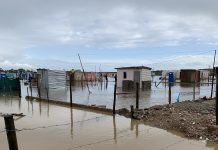JUBA - Médecins Sans Frontières (MSF) has launched emergency assessments in the east and northeast of South Sudan where severe flooding has left thousands of people stranded in inaccessible areas, threatening to make worse an already catastrophic humanitarian crisis.
“We are urging all organisations to mobilise resources to mitigate the impact of rising flood levels in affected locations, and to ensure adequate attention is given to Pibor, in the east of the country,” Roderick Embuido, MSF’s medical coordinator in South Sudan.
In Maban, in the northeast of the country, UNHCR estimates that more than 200,000 people have been affected by flooding.
“Our attention is on urgently conducting aerial and ground assessments to understand the broader impact of the flooding and to adapt our existing activities in Pibor to a continuously changing situation,” says Kim Gielens, MSF head of mission in South Sudan.
“We know that with rising and contaminated water sources comes the risk of outbreaks of deadly waterborne diseases like cholera and hepatitis A.
“We can also expect a rapid increase in acute watery diarrhoea, malaria and respiratory tract infections - three of the biggest killers in South Sudan. International and national organisations must mobilise immediately to ensure provision of food, water, shelter and healthcare, and ensure adequate attention is given to Pibor where the entire population is now cut off from healthcare and assistance.”
MSF is concerned that flooding will increase the risk of malnutrition due to the destruction of personal food stocks and crops. In Maban, people tell us that the price of what little food is available in the markets has tripled and is no longer affordable.
In a country where malaria is the biggest killer of children under 5 years and where we treat close to 300,000 patients per year, any increase in this vector-borne, life-threatening disease will have grave consequences for people cut off from access to care.
Seven million people, or about two-thirds of the population, are already in dire need of humanitarian assistance in South Sudan and the consequences of severe flooding will further exacerbate their situation, undermining resilience, coping mechanisms and access to lifesaving services.












